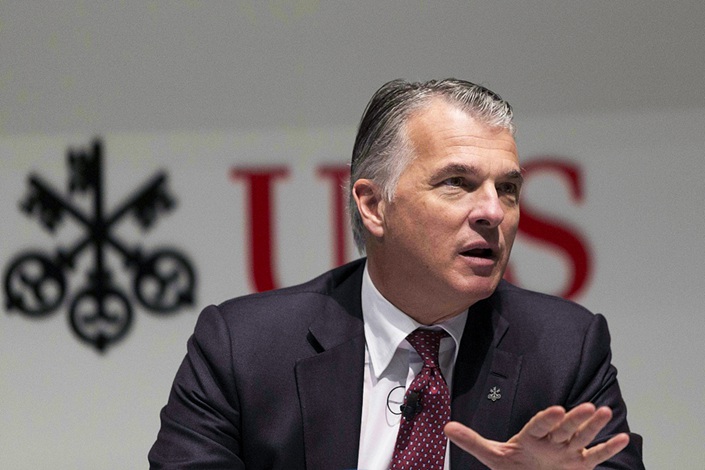
UBS Group AG is looking to further expand its presence in China, a market that remains important to the company, CEO Sergio Ermotti told Caixin during his first trip to China since the Swiss banking giant took over troubled rival Credit Suisse Group AG in June.
“We have been a pioneer [in China] and we want to continue to play a role of a leader here, particularly now — after the acquisition of Credit Suisse, we are definitely moving up a further level in terms of breadth and capabilities that I’m sure will serve us well in China,” he said in an interview with Caixin in Beijing on Monday.
During Ermotti’s visit, UBS signed a memorandum of understanding with Industrial and Commercial Bank of China Ltd. (ICBC) (601398.SH), one of China’s “Big Four” state-owned banks, to explore cooperation opportunities in fields including asset management, wealth management, investment banking, and corporate banking.
“UBS’ global strength together with ICBC’s leading position in China and Asia will put us in a unique position to offer international investors access to China as well as to support Chinese companies and investors wishing to go global,” he said in a press release.
Credit Suisse and ICBC already have a mutual fund joint venture — ICBC Credit Suisse Asset Management Co. Ltd. The Swiss bank has a 20% stake in the company which had 1.72 trillion yuan ($247 billion) of assets under management at the end of 2022, according to ICBC data.
“Credit Suisse had a very successful and very important joint venture with ICBC that we believe is strategically important, and we are very proud and keen to continue to develop that,” Ermotti told Caixin. “We also look at other areas of expansions, for example, in our capabilities in investment banking. So across the board, there are plenty of opportunities.”
Ermotti, who was UBS CEO for nine years until 2020, returned to the position in April, just as the Swiss banking giant started the takeover of Credit Suisse.
“My first trip to Asia [since being reappointed] is indeed focused on coming to China, to Beijing, to reach out to our most important stakeholders here — regulators and clients — to update them on our progress in the integration, but also to reiterate our commitment to the Chinese market,” Ermotti said.
The acquisition, which was completed in June, had complicated UBS’ expansion in the world’s second-largest economy, as the stakes held by the combined company in certain financial firms in China would have exceeded the regulatory threshold. UBS had to scrap a plan to set up a wholly owned mutual fund management company in China, Caixin previously learned from sources with knowledge of the matter.
Read more China Complicates UBS’ Acquisition of Credit Suisse
“We are assessing the best options,” Ermotti said. “Of course, we are not allowed to have [controlling stakes in] two securities operations. So, we need to exactly finalize our plans and we’re thinking about that as we speak. We are very happy with our two asset management operations. And we will focus on the best way forward.”
While the Chinese economy may be expanding at a slower pace, and complexities remain in its post-pandemic recovery and geopolitical tensions, investors are not exiting the market, he said.
“Of course, the economic situation in China is no longer the one we saw in the last 20 years … But I haven’t heard anybody saying that they want to exit China,” Ermotti said. “It’s just a matter of how fast they want to grow in China, rather than making an exit.”
Rewritten by Zhang Yukun
Contact reporters Wang Liwei (liweiwang@caixin.com) and Zhang Yukun (yukunzhang@caixin.com) and editor Nerys Avery (nerysavery@caixin.com)
Get our weekly free Must-Read newsletter.







